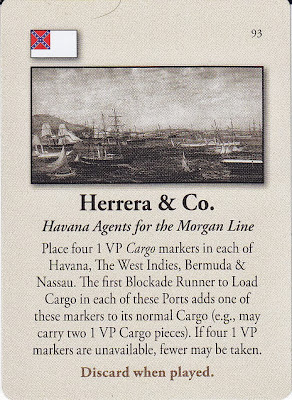Last week a gamer asked about how Rebel Raiders on the High Seas
handles “the interplay between Southern military
fortunes and how far Britain and France would risk war by building Southern ships?"
As a strategic naval game of the
war, Rebel Raiders has to account for the role played by the great powers of Europe . It does this in several ways:
-1. Ship Building
-Each turn the Confederacy can
build one Raider in either of the two overseas map spaces that represent England and France . Doing so uses up
one of the South’s allotted builds (usually five a turn, but fewer as the South
loses cities), and also requires the expenditure of a Victory Point (this
reflects the cost of purchasing and arming the Raider). There are also cards that provide the South
with a free Raider in one of those ports, and special Raiders at that (CSN Card 63 – CSS
Alabama, CSN Card 64- CSS
Shenandoah and CSN Card 74-CSS
Stonewall).
-2. Ship Building
-Each turn the Confederacy may
build one or more Blockade Runners overseas.
In 1861 the South builds one abroad, in 1862 they may build two, in
1863, three and in 1864, up to four.
Again, these count toward the South’s allotted builds (although by 1864
the South usually has been reduced below its original build level, and is also
less likely to build Blockade Runners as there are either few ports left to
unload in, or those ports are so heavily blockaded by the Union as to make
getting in or out of them extremely risky. There are also cards that give the
South free Blockade Runners in
Europe (CSN Card 84 – The Douglas) and in the other
overseas boxes, most of which were part of the British, French or Spanish
empires (CSN Card 108-War Profiteers)
-3. Investment:
European Front Companies provide Arms to the South
The South relied on European
companies for much of its war material (as well as luxury goods and civilian
necessities). The loading/unloading of
Victory Points (VPs) reflects that, as these VPs may be used to purchase ships
and batteries and counterattacks, and are needed to fend off the degradations
of the Supply Roll and penalties for losing cities. Several cards reflect this trade, and the
establishment of front companies in their colonies by European interests which
fed arms and other goods to the South.
These include CSN Card 99 – The Queen’s Artillery – which allows the
South to cash in one 2 VP European cargo counter for a battery …which normally
costs 20 VPs, and Cards 87 –Cotton is
King, 93 – Herrera & Co. and 94
– To the Dark Shores, each of which offers the South increased
opportunities to gain additional VPs.
-4. “Intervention”: Trent Affair, Maximillian, and Royal
Navy
-While some games and novelists
like to toy with the ‘what if’ of French or British armies or navies fighting
for the Southern cause, Rebel Raiders sticks to what these
great powers did do, as is reflected in the Cards in the game. The play of the Trent Affair (CSN Card 83)
provides an opening for the play of Maximillian
(CSN Card 61) and Royal Navy (CSN Card 62). The first makes Mexico , where the French had installed Maximillian as emperor,
very friendly to the South: providing one free Blockade Runner a turn plus a modifier to the Southern Supply Roll
die. The second simulates the movement
of British warships and troops to Canada (which occurred as part of Britain ’s angry response to the Trent debacle) by requiring the Union to take
warships out of play to guard against this threat (as also occurred).
-5. The Emancipation Proclamation and Diplomatic Pressure
-The Emancipation Proclamation event changes how Europe viewed
the war, and reduces European support to the Confederacy. It removes
Trent, Maximillian and Royal Navy from the game (and if Royal Navy has been played, frees up
the Union warships which responded to it).
It also removes two of the six VP
cargo markers from play, which makes it more difficult for the South to bring
home large amounts of Victory Points each turn. Diplomatic
Pressure (USN Card 55) forces the discard of Trent or Royal Navy and,
if played after The Emancipation
Proclamation, closes one of the two European ports. Any Confederate ships in that closed port are
either chased out (where they can be intercepted) or seized by the European
government.






No comments:
Post a Comment